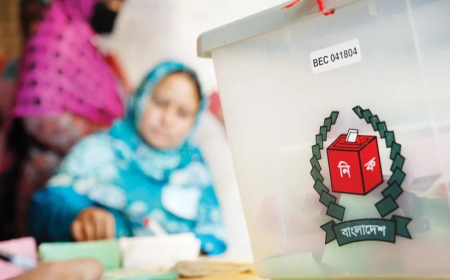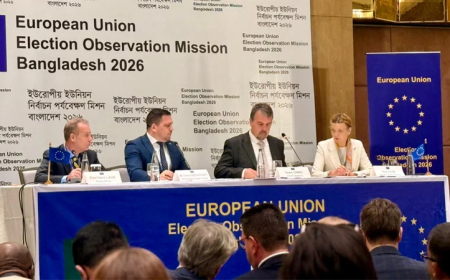Between the Barracks and the Ballot: Decoding General Wakar’s Closed-Door Calculus
Could General Wakar’s words be interpreted as a masterclass in layered messaging -- a high-stakes chess match played across three boards –- domestic politics, regional pressure, and international diplomacy?

When the Chief of Army Staff, General Wakar-uz-Zaman, stepped into a closed-door meeting with his officers, few anticipated a speech that would leave so much open to interpretation.
At first glance, his address came across as a firm reminder of military neutrality and national sovereignty. But scratch the surface, and a different, more complex picture emerges, one riddled with contradictions, veiled threats, political posturing, and perhaps, a very subtle balancing act amidst regional power plays.
Let’s unpack the contradictions and what they might mean.
“Professionalism” or Selective Amnesia?
General Wakar began by thanking his officers for their professionalism. But who exactly is being applauded here? The officers who refused to act as the enforcers of the Awami League’s repression or those who looked the other way, collaborated with outside powers and shielded an authoritarian regime for over a decade?
If it’s the former, the praise is earned. If it’s the latter, it’s dangerous whitewashing, glossing over a deep moral divide within the military itself.
A Political Government Should Govern? Now?
The General suddenly declares it's time for a political government to take over. A noble sentiment and a convenient one. But where was this wisdom during the rigged elections, the forced disappearances, and the trampling of the Constitution under the guise of “stability”? Let us not dress up silence during those years as statesmanship.
The Corridor Conundrum: Patriotism or Proxy Politics?
Wakar’s firm rejection of any kind of “corridor” may score points with nationalists but it's not even his call. Decisions on corridors or aid passage and ports fall under the government, more specifically the Commander-in-Chief. His pre-emptive veto raises questions: is this about national interest or a silent nod to Indian sensitivities?
Let’s be clear: any progress made by the Yunus administration on Rohingya repatriation undermines India's Kaladan project logistics and exposes Sheikh Hasina’s decade-long failure. So Wakar’s blanket opposition isn’t patriotic resistance, it's tactical obstruction that aligns conveniently with Indian discomfort and Awami political interests.
Even more ironic is his rejection of foreign influence, this from someone accused of operating under Indian guidance and meeting Indian Foreign Secretary Vikram Misri outside protocol. Are we supposed to applaud sovereignty while ignoring servitude?
Election Deadlines from the Barracks
Wakar’s comment hoping for elections by January 1, 2026, isn’t just premature, it a pressure tactic. Election timelines aren’t for generals to announce. This isn't military rule. His remark seems to echo more of New Delhi’s impatience than any genuine democratic foresight.
The “Foreign Interference” Dog Whistle
His cryptic remark about foreign individuals arriving to “influence sensitive national matters” sounds like a not-so-subtle dig at National Security Adviser Khalilur Rahman – a target of orchestrated rumours about dual citizenship, mainly from India-aligned lobbies and Awami leftovers.
Yet Khalilur has publicly clarified he holds only Bangladeshi citizenship. So why the shade? Because his presence rattles the status quo especially those who once profited under Hasina’s India-centric regime.
The UN Report Blackout – Or a Convenient Bluff?
Wakar claims the army was unaware of the UN’s July-August human rights report. This strains credulity. It’s a calculated move to shift blame onto the previous civilian government, one he technically served under.
But here’s the kicker: if he fumbles the humanitarian narrative, Bangladesh risks losing critical UN peacekeeping deployments – a financial and strategic asset for the army.
“Political Problems Need Political Solutions” -- But on What Terms?
It’s easy to say political problems need political solutions. But without structural reforms, that’s just rhetoric. Until electoral justice and institutional accountability are implemented, “solutions” are little more than recycled smokescreens.
Proxy War Paranoia or Strategic Independence?
Wakar warns that Bangladesh is becoming a battlefield for foreign powers – a “proxy war.” But where’s the evidence? On the contrary, recent defense upgrades, like potential J-10C acquisitions, suggest a strategic pivot toward regional independence not foreign entanglement.
This isn’t about proxy conflict. It’s about escaping Indian hegemony. Something the army itself was historically discouraged from doing.
Law and Order Rhetoric: With Teeth or Just Bark?
The army says it won’t tolerate violence or lawlessness. But if the magistracy powers were already granted, why weren’t they enforced earlier? This “newfound resolve” is only credible if backed by action – something that remains to be seen.
Reforms Ignored — Which Ones?
If the “reforms” part of what the army recommended include the reopening of the investigations of the BDR massacre and distancing from Indian influence then yes, they should be taken seriously. But if it’s just an attempt to reclaim lost privileges under a post-Awami civilian setup, the public isn’t buying it.
A Contradiction Wrapped in Patriotism
Interestingly, the second half of Wakar’s remarks take a completely different tone. He praises Dr. Yunus and his advisors. He acknowledges the pain of the poor. He instructs the suspension of sports events to maintain election focus. These aren’t the words of a General ready for confrontation, they’re the words of a man walking a tight diplomatic rope.
This could signal a quiet understanding between Yunus and Wakar – a tacit agreement where Wakar is allowed to pacify India publicly, while Yunus pushes forward with reforms, UN negotiations, and transitional justice behind the curtain.
A General Playing Three Boards
This wasn’t just a pep talk to his officers. General Wakar’s closed-door address was a masterclass in layered messaging. A high-stakes chess match played across three boards – domestic politics, regional pressure, and international diplomacy.
His early remarks sound anti-Yunus, anti-UN, anti-US – echoing the grievances of the old order. But it also conveniently suggests a clever understanding between Wakar and Yunus to allow Waker to say things to pacify India on the surface while Yunus continues with his reform agendas. So was this a warning shot or a performance? Was it insubordination or calculated theatre?
One thing is clear: General Wakar knows he’s being watched by Dhaka, Delhi, DC, and by a younger generation of officers and troops from within the military itself.
Whether this balancing act leads to national stability or topples under its contradictions depends not just on the General but on whether strategy can truly replace firepower in a small army boxed in by neighbours and shadows.
And let’s not forget this wasn’t an ISPR statement. It was a strategic leak, from a closed-door meeting, designed for social media digestion.
And it might just have worked.
What's Your Reaction?














































































